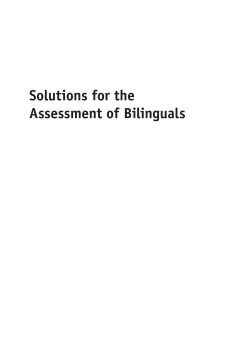
Additional Information
Book Details
Abstract
Solutions for the Assessment of Bilinguals presents innovative solutions for the evaluation of language abilities and proficiency in multilingual speakers – and by extension, the evaluation of their cognitive and academic abilities. This volume brings together researchers working in a variety of bilingual settings to discuss critical matters central to the assessment of bilingual children and adults. The studies include typically developing bilingual children, bilingual children who may be at risk for language impairments, bilingual and multilingual children and adults found in classrooms, and second-language learners in childhood and adulthood. The contributions propose a variety of ways of assessing performance and abilities in the face of the multiple issues that complicate the best interpretation of test performance.
Researchers and practitioners are frequently challenged when faced with the assessment of bilinguals. The authors of this book tackle this challenge from different sociolinguistic perspectives and propose strategies for the assessment of bilinguals across different age groups, abilities, and domains. Their thoughtful insights provide research-based principles to build a unified foundation that can stimulate new directions in research and practice.
Virginia C. Mueller Gathercole is Professor of Linguistics at Florida International University, Professor of Psychology at Bangor University, and until recently acted as Co-Director of the Centre for Research on Bilingualism in Theory and Practice at Bangor University. Her research focuses on monolingual and bilingual language acquisition, especially in relation to semantics, morpho-syntax and assessment, and the acquisition of English, Spanish, and Welsh in Spanish-English, Welsh-English, and Spanish-Welsh bilinguals. Professor Gathercole is an Associate Editor of First Language and has been working in the field for over 30 years.
This book, edited by Virginia Gathercole, a leading figure in the study of bilingualism and multilingualism, presents cutting-edge research in a burgeoning field and provides a comprehensive perspective on the assessment of bilinguals which is desperately needed. The book can serve as a valuable source not only for researchers interested in solutions for assessment of bilinguals but also for students and clinicians who want to study and work with this population.
Table of Contents
| Section Title | Page | Action | Price |
|---|---|---|---|
| Contents | v | ||
| List of Tables and Figures | vii | ||
| Contributors | xi | ||
| 1 Assessment of Bilinguals: Innovative Solutions | 1 | ||
| 2 Identification of Reading Difficulties in Students Schooled in a Second Language | 10 | ||
| 3 What Are the Building Blocks for Language Acquisition? Underlying Principles of Assessment for Language Impairment in the Bilingual Context | 36 | ||
| 4 Using Parental Report Assessment for Bilingual Preschoolers: The Basque Experience | 57 | ||
| 5 Using Parent Report to Assess Bilingual Vocabulary Acquisition: A Model from Irish | 81 | ||
| 6 Development of Bilingual Semantic Norms: Can Two Be One? | 103 | ||
| 7 Vocabulary Assessment of Bilingual Adults: To Cognate or Not to Cognate | 125 | ||
| 8 Profiling (Specific) Language Impairment in Bilingual Children: Preliminary Evidence from Cyprus | 146 | ||
| 9 Sociolinguistic Influences on the Linguistic Achievement of Bilinguals: Issues for the Assessment of Minority Language Competence | 175 | ||
| 10 The Effects of Peer Feedback Practices in Spanish Second Language Writing | 194 | ||
| 11 Commentary on Issues in the Assessment of Bilinguals and Solutions for the Assessment of Bilinguals | 213 | ||
| Index of Tests and Measures | 227 | ||
| Index of Languages | 229 | ||
| Index of Terms | 230 |
